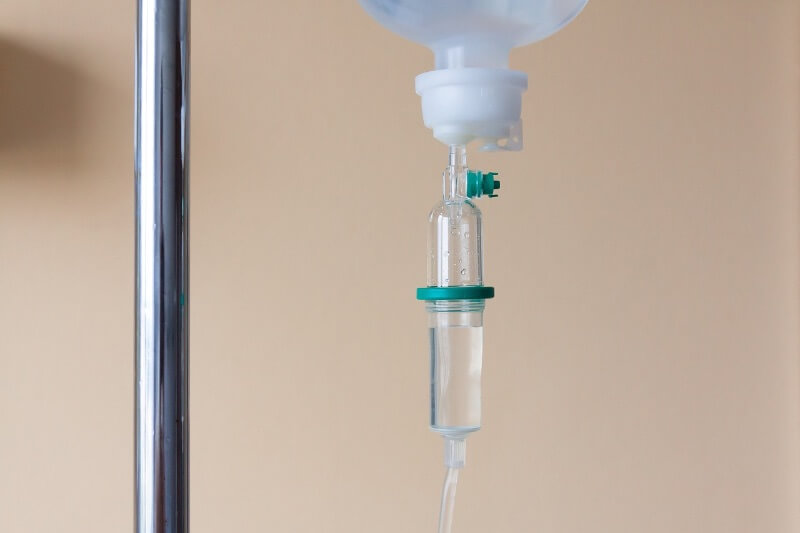Interventional vitamin therapy is a medical treatment that involves the administration of vitamins, minerals, and other nutrients directly into the bloodstream through intravenous infusion. In this way, the digestive system is bypassed, which allows faster and more efficient absorption of nutrients in the body.
During interventional vitamin therapy, a healthcare professional inserts a needle into a vein, usually on the arm, and associates it with a bag containing a solution of vitamins, minerals, and other useful substances. The specific composition of the intravenous solution may vary depending on the needs of the individual and the goals of therapy.
It is important to note that while vitamin therapy may be beneficial for individuals with specific health conditions, it is not a substitute for a healthy diet or primary therapy for the illness.
Benefits of intravenous vitamin therapy
It is believed that the interventional use of vitamins can provide various health benefits, such as increasing energy levels, improving immune function, hydrating the body, detoxifying, and supporting the general state of health. It is sometimes used as a complementary or alternative therapy for conditions such as fatigue, migraine, hangovers, and certain nutrient deficiencies. The benefits may vary depending on the specific formulation of the infusion used and the patient receiving the treatment.
- Improved nutrient absorption: Bypassing the digestive system, intravenous administration allows direct entry of vitamins, minerals, and other nutrients into the bloodstream, potentially leading to a higher rate of absorption compared to oral supplements.
- Increased energy levels: Some people report increased energy and a general sense of well-being after intravenous vitamin therapy. Infusion can help support cellular metabolism and energy production.
- Hydration: Intravenous therapy can provide rapid rehydration because fluid is given directly into the bloodstream. This can be useful for people who are dehydrated due to a number of causes such as excessive sweating, illness, or alcohol consumption.
- Immune system support: Certain vitamins and minerals are essential for a healthy immune system. Intravenous vitamin therapy can provide a concentrated dose of these nutrients, potentially boosting immune function and helping the body fight infections and diseases.
- Detoxification: Certain formulations of intravenous vitamin therapy include substances such as glutathione, a powerful antioxidant that aids in the body’s detoxification processes. It is believed that these antioxidants help in the removal of harmful substances and toxins from the body.
- Nutrient replenishment: Intravenous vitamin therapy can be used to address specific nutrient deficiencies. For example, people with low levels of certain vitamins or minerals may benefit from targeted intravenous supplementation to replenish their nutrient supplies.
- Hangover relief: Intravenous vitamin therapy, especially formulations that include fluids and electrolytes, are sometimes promoted as a hangover cure. Infusion of fluids and nutrients can help relieve symptoms associated with alcohol consumption, such as dehydration and fatigue.

Effectiveness of infusion
The effectiveness of IV vitamin therapy is a topic of current debate and scientific research. While some report positive experiences and benefits of intravenous nutrient infusions, the scientific evidence supporting its widespread use is limited and often unspecified.
Many claims about the benefits of intravenous vitamin therapy are based on anecdotal reports and testimonials, rather than rigorous scientific studies. There is still a lack of well-designed, extensive clinical trials that assess the efficacy and safety of this therapy for various conditions.
Intravenous vitamin therapy will benefit people with certain nutrient deficiencies or malabsorption problems. In these cases, targeted intravenous nutrient supplementation can help to replenish nutrient levels faster than oral intake.
It is important to note that people may react differently to intravenous vitamin therapy due to variations in the body, nutrient status, and specific health conditions. A personalized assessment and guidance from a healthcare professional are essential to determine whether intravenous vitamin therapy is appropriate and beneficial for an individual.
Types of vitamin therapy
There are different types of intravenous vitamin therapy, and the specific nutrient formulation used may vary depending on individual needs and treatment goals.
Myers cocktail is a well-known and widely used infusion that usually includes a combination of vitamins and minerals, such as vitamin C, B vitamins (such as B1, B2, B3, B5, B6, B12), magnesium and calcium. It is often promoted for general health, immune support, and energy boosting.
High doses of vitamin C: Intravenous therapy with vitamin C involves administering high doses of vitamin C directly into the bloodstream. It is often used as an adjunct therapy in the treatment of cancer, aimed at supporting immune function and potentially improving treatment outcomes.
Glutathione therapy: Glutathione is a powerful antioxidant that plays a key role in cellular detoxification. Intravenous glutathione therapy involves infusion of glutathione directly into the bloodstream and is used to potentially support detoxification processes and improve the general condition of the body.
B-complex infusions: B-complex infusions contain a combination of B vitamins, including B1, B2, B3, B5, B6 and B12. These infusions are often used to help produce energy and improve cognitive function, and these vitamins also contribute to the health of the skin, hair, and nails.
An infusion specifically designed for athletes and active individuals usually includes a mixture of hydration fluids, electrolytes, B vitamins, and sometimes additional nutrients such as amino acids or carnitine, with the aim of replenishing fluid, improving energy levels, and accelerating muscle recovery.
Infusions to boost immunity: These intravenous infusions are formulated to potentially improve immune function and include a combination of substances such as vitamin C, zinc, and selenium.
The specific composition of intravenous infusion may vary between clinics. The choice of therapy should be based on individual needs and should be determined in consultation with a qualified healthcare professional who can assess the suitability and safety of treatment.
Possible side effects of infusion
Although intravenous vitamin therapy is generally considered safe when administered by qualified healthcare professionals, there are potential side effects and risks associated with the procedure. Here are some possible side effects:
- Infection: There is a risk of infection at the injection site or along the vein through which the infusion is administered. By observing sterile techniques, this risk is reduced to a minimum.
- Vein irritation or phlebitis: Infusion of fluids and nutrients through a vein can cause irritation or inflammation of the vein, known as phlebitis. This can lead to pain, redness and swelling around the injection site.
- Allergic reactions: Some of these may develop allergic reactions to certain components of intravenous solution, such as vitamins, minerals, or other additives. Symptoms of an allergic reaction can include rash, itching, swelling, dizziness, or shortness of breath. It is essential to inform healthcare professionals of any known allergies or sensitivities before intravenous therapy.
- Electrolyte imbalance: Some intravenous vitamin therapies also include electrolytes such as potassium, sodium, or magnesium. Improper dosing or an imbalance in electrolyte levels can have adverse effects on the functioning of the body, leading to complications such as heart rhythm abnormalities or muscle weakness.
- Fluid overload: In certain cases, excessive administration of fluid during intravenous therapy can lead to fluid overload. This can cause symptoms such as swelling, shortness of breath and increased load on the heart.
- Kidney problems: Excessive amounts of certain nutrients, such as vitamin C, can potentially burden the kidneys, especially in people with pre-existing kidney problems. Monitoring of kidney function and dose adjustment is necessary.
- Drug interactions: If a person takes medication, interactions with intravenous vitamin therapy may potentially occur. It is important to list all medicines to a healthcare professional before administration of the infusion, including prescription drugs, over-the-counter drugs, and supplements. They can evaluate potential interactions and adjust the treatment plan accordingly.

Some of the drugs that could lead to interactions are:
Anticoagulant drugs (blood clotting drugs): Certain intravenous vitamin infusions, such as those containing high doses of vitamin C, can also dilute the blood. If a person takes anti-clotting medications such as warfarin or aspirin, there may be an increased risk of bleeding or blood clotting disorders.
Chemotherapy: Intravenous therapy with vitamin C, sometimes used as a cancer therapy supplement, may interact with certain chemotherapy drugs. It is important to consult an oncologist and a healthcare team to determine whether intravenous vitamin C therapy is appropriate and safe in combination with specific chemotherapy agents.
Drugs that are metabolized in the liver: Certain vitamins and minerals used in infusions, and especially in high doses, can affect the metabolism of certain drugs in the liver. This can potentially lead to a change in the level and effectiveness of the drug.
Kidney function: Certain substances in infusions, such as high doses of vitamin C or certain minerals, can put additional strain on the kidneys. People with pre-existing kidney problems or those taking medications that affect kidney function should be closely monitored during intravenous therapy to prevent any complications.
Electrolyte balance: Some intravenous vitamin therapies include electrolytes such as potassium or magnesium. It is important to monitor electrolyte levels, especially in people taking medications that can affect electrolyte balance, such as diuretics or certain heart medications.
It is essential that vitamin therapy is carried out exclusively under the supervision of a qualified healthcare professional who can assess individual needs, monitor potential side effects, and tailor the therapy accordingly. If you experience any adverse reaction or worry during or after treatment, it is important to seek immediate medical attention.
Recommendations regarding intravenous therapy
If you are considering intravenous vitamin therapy, follow these recommendations to ensure safe and appropriate treatment:
Consult with a healthcare professional: Before intravenous vitamin therapy, be sure to consult a qualified healthcare professional, such as a doctor or nurse, who has experience in administering intravenous therapies. They can assess your medical history, current medical condition, and determine if intravenous vitamin therapy is suitable for you.
Individualized treatment plan: Nutritional needs and health conditions vary in each person. Together with a healthcare professional, you will create an individualized treatment plan that suits your specific needs and goals. The composition of the intravenous infusion should be tailored to your needs.
Appropriate medical supervision: Intravenous vitamin therapy should be administered exclusively by trained healthcare professionals in a clinical setting. Make sure the healthcare professional is experienced in the administration of intravenous therapies and that they follow appropriate sterile techniques to reduce the risk of infection and other complications.
Medical history and medication: Provide a comprehensive medical history, including all topical medications, supplements, and medical conditions, to a healthcare professional who oversees your intravenous therapy. This information is crucial for assessing potential drug interactions and conducting safe therapy.
Regular monitoring: Throughout the course of vitamin therapy, it is important to regularly monitor the state of health and potential side effects. This may include vital signs, laboratory tests, and evaluation of any changes, onset of symptoms, or worsening of the condition. Any concern or adverse reaction should be reported to a healthcare professional immediately.
Balanced approach: Intravenous vitamin therapy is not a substitute for a balanced diet and a healthy lifestyle. It is exclusively a complement to a healthy lifestyle: a healthy diet, regular exercise, stress management and adequate sleep.
Avoid excessive or unnecessary therapy: Intravenous vitamin therapy should only be used when there is a specific medical indication or deficiency. Avoid excessive or unnecessary therapy, as there is limited evidence to support routine use of intravenous vitamin infusions in healthy individuals without special need.

What is important to remember in connection with the application of infusion?
While some individuals report positive experiences and benefits, the scientific evidence supporting its widespread use is limited and vague. The effectiveness of intravenous vitamin therapy varies depending on the specific formulation, individual needs, and underlying health conditions.
It is essential to approach intravenous vitamin therapy with caution and under the guidance of a qualified healthcare professional. He can assess your medical history, nutritional status, and treatment goals to determine if intravenous therapy is appropriate and safe for you. It is also very important that you list all the medications and supplements you are taking to reduce the risk of drug interactions or complications.
While intravenous vitamin therapy may have potential benefits for certain medical conditions or nutrient deficiencies, it is not a substitute for a healthy diet or primary therapy for serious health conditions. A balanced approach that includes a nutritious diet, regular exercise and a generally healthy lifestyle is key to supporting your well-being.
We recommend that you stay informed about the latest research and consult with healthcare professionals who can provide evidence-based guidance tailored to your individual needs. By making informed decisions and working closely with healthcare professionals, you can optimize the benefits and minimize the risks associated with intravenous vitamin therapy.


